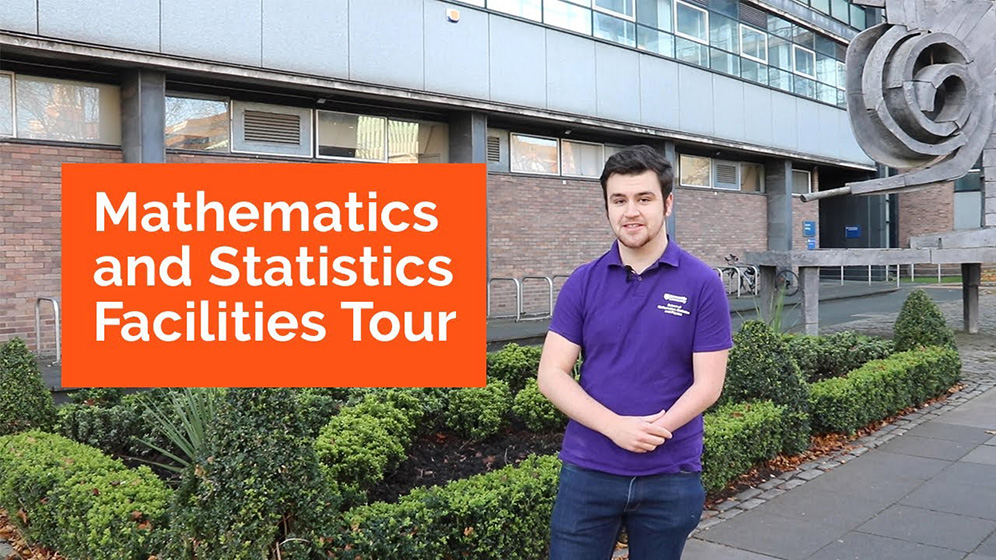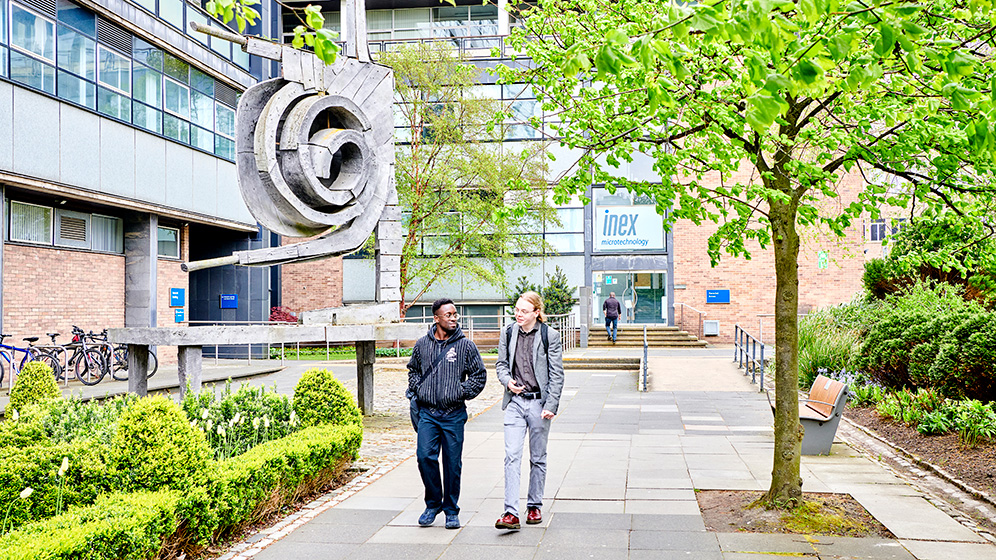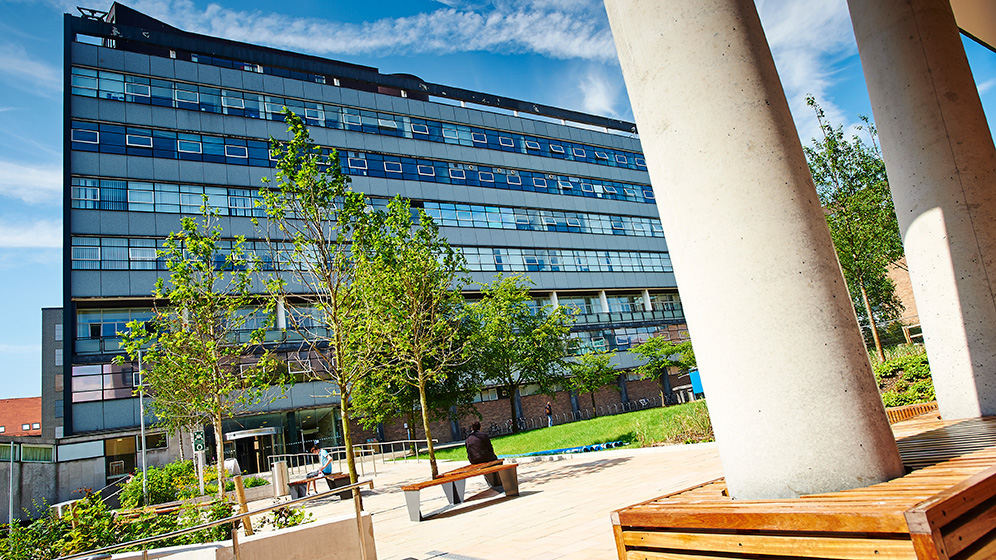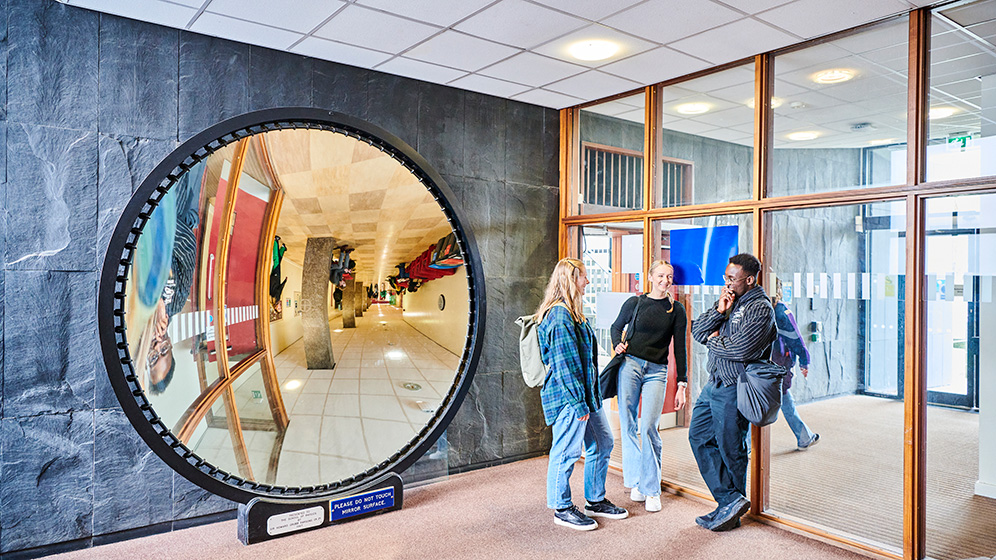Statistics MSc
Master the science of data and uncertainty. Learn to develop advanced statistical and machine learning methods so you can deliver innovative, data-driven solutions to real-world problems.
You are currently viewing course information for entry year:
Start date(s):
- September 2026
Overview
Statistics and probability are the cornerstones of modern data science, machine learning, and artificial intelligence. As these skills become increasingly important across various fields, our Statistics MSc programme will equip you with the knowledge and expertise needed for your career.
Through this degree, you’ll embark on your journey to master statistics. Take your understanding to new depths, while challenging yourself with finding data-driven solutions to real-world problems.
This Statistics MSc offers a unique blend of graduate training in statistics and probability, as well as their practical application. You’ll explore a wide range of advanced topics and will gain a comprehensive understanding of the discipline. Our curriculum is designed to develop your expertise in cutting-edge research, allowing you to foster innovation and stay at the forefront of your chosen field.
A key feature of this programme is the dissertation project. You’ll bridge the gap between academic theory and real-world application. You’ll work directly with both industry leaders and our esteemed academics who are pioneers in their discipline. Through this hands-on experience, you will:
- tackle real challenges faced by companies and researchers
- build a professional network
- gain invaluable experience that will set you apart in your career
READ MORE
Important information
We've highlighted important information about your course. Please take note of any deadlines.
Please rest assured we make all reasonable efforts to provide you with the programmes, services and facilities described. However, it may be necessary to make changes due to significant disruption, for example in response to Covid-19.
View our Academic experience page, which gives information about your Newcastle University study experience for the academic year 2025-26.
See our terms and conditions and student complaints information, which gives details of circumstances that may lead to changes to programmes, modules or University services.
Qualifications explained
Find out about the different qualification options for this course.
An MSc is a taught Master’s degree. It usually involves the study of a science-related subject.
You'll usually study an MSc full-time over 12 months.
A Master of Science is typically awarded for the successful completion of 100 credits of taught modules and an 80-credit dissertation or research project.
Find out about different types of postgraduate qualifications.
What you'll learn
You’ll develop an understanding of fundamental statistics and probability, while gaining practical skills in data management, integration, and handling. You’ll also gain expertise in a broad range of computational and statistical methods for solving complex data analysis problems.
Exposure to various application areas and the choice of specialisms for in-depth study will further enhance your learning experience.
Your dissertation project will position you as a well-rounded expert, ready to contribute meaningfully to any organisation or research institution.
Modules
You will study modules on this course. A module is a unit of a course with its own approved aims and outcomes and assessment methods.
The module information below is intended to provide an example of what you will study.
Our teaching is informed by research. Course content changes periodically to reflect developments in the discipline, the requirements of external bodies and partners, and student feedback.
Full details of the modules on offer will be published through the Programme Regulations and Specifications ahead of each academic year. This usually happens in May.
To find out more please see our terms and conditions.
Optional modules availability
Some courses have optional modules. Student demand for optional modules may affect availability.
| Compulsory Modules | Credits |
|---|---|
| Graduate Foundations of Statistics and Data Science | 30 |
| Graduate Foundations of Probability and Mathematical Statistics | 30 |
You also choose one of the following modules:
- Dissertation in Statistics (60 credits)
- Industrial Dissertation in Statistics and Data Science (60 credits)
How you'll learn
You’ll be taught using a range of methods, including:
- lectures
- seminars
- practical computer lab sessions
- group work
- project work
Teaching will be delivered by experts from the School of Mathematics, Statistics, and Physics.
Depending on your modules, you'll be assessed through a combination of:
- Case study
- Computer assessment
- Dissertation
- Oral presentation
- Poster
- Problem-solving exercises
- Report
- Written examination
- Written exercise
Numbas learning software
You'll have access to a specialist learning software called Numbas. Developed at Newcastle University, it's now used by mathematicians and statisticians worldwide.
This innovative software allows you to work on interactive code worksheets, so you can test and refine your skills throughout your course.
Specialist software and tool support
You'll have support from our award-winning Digital Learning Team, who can assist you with the specialised software and tools you need for the programme.
Throughout your studies, you’ll have access to support from:
- academic staff
- personal tutors and research supervisors
- our University Student Services Team
- student representatives
- peers
You'll also be assigned an academic member of staff, who will be your personal tutor throughout your time with us. They can help with academic and personal issues.
Your teaching and learning is also supported by Canvas. Canvas is a Virtual Learning Environment. You'll use Canvas to submit your assignments and access your:
- module handbooks
- course materials
- groups
- course announcements and notifications
- written feedback
This course is delivered by the School of Mathematics, Statistics and Physics. Our teaching staff are experts working at the forefront of statistical research and practice.
You'll work alongside academics from the following research groups:
- Statistics: World-class research in modern statistics and data science.
- Astrostatistics: Cutting-edge research being carried out at the interface of physics and statistics, using modern data science techniques to help understand the universe.
- Scalable Computing: Internationally renowned for tackling research challenges in high performance systems, data science, machine learning and data visualisation.
- Biostatistics: Over 30 statisticians working in developing and applying innovative methods in clinical trials and observational studies.
Newcastle University is also home to the UK’s National Innovation Centre for Data (NICD), which has extensive links with industrial partners across a range of sectors.
Your development
You'll develop your essential skills and experience throughout the course.
You’ll learn professional skills needed for your career including:
- critical thinking
- problem-solving
- communicating complex insights
You’ll also master research skills through an extended dissertation project. You’ll use advanced statistical theory and apply computational tools to real-world problems.
You’ll also develop practical skills in data storage, manipulation, and presentation using statistical software, along with the ability to effectively communicate insights.
Your future
Your career
Through our strong industry connections, fostered by both our research and degree programme, you'll gain valuable insights and opportunities to explore diverse career paths.
Our Statistics MSc prepares you for a wide range of careers involving statistics and data science, fundamental in areas such as:
- AI development
- finance
- consultancy
- healthcare
- research
You could pursue a career in roles such as:
- Data Scientist
- Statistician
- Biostatistician
- Data Analyst
- Risk Analyst
- Machine Learning Engineer
Further study
This course provides a route into PhD level study in various fields, depending on your choice of optional modules. Examples include:
- statistical methodology
- probability theory
- applied statistical science
Industry links
You’ll benefit from our connections with industry leaders, gaining access to:
- valuable networking opportunities
- internships
- insights into real-world applications of statistics
Our School's Industrial Advisory Board compromises leaders from prominent companies including:
- Jumping Rivers
- Roche
- Oliver Wyman
- Atom Bank
- Arup
- Royal Meteorological Society
- National Nuclear Laboratory
- DEFRA
- Sage
- Atkins Realis
Our academics also have research connections with organisations such as:
- Microsoft Research
- Newcastle United Football Club
- Leeds and York Partnership NHS Foundation Trust
- AliveCor
- Freegle
- Pole Star Global
- Croud
- Anglian Water
- UK Power Networks
- Northern Gas Networks
- BT
- European Food Safety Authority
- Costello Medical
- Centre for Process Innovation
- Advanced Engineering Solutions
Our Careers Service
Our expert Careers Service is here to help you take the next steps in your professional life. We will support you while you’re studying with us and for up to three years after you graduate.
You will have access to expert one-to-one advice and guidance through our campus careers centre and online, along with digital resources, workshops, networking opportunities, and careers and recruitment events.
We’ve been awarded 5 QS Stars for Student Employability (2025). Many of our degrees are shaped by strong links with national and international businesses. We are committed to helping you access real-world experience opportunities and develop key skills through paid work placements and internships.
Quality and ranking
All professional accreditations are reviewed regularly by their professional body
If you’re studying an accredited degree and thinking about working in Europe after you graduate, the best place to find current information is the UK Government’s guidance on recognition of UK professional qualifications in EU member states. This official resource explains whether your profession is regulated in another country, what steps you need to take, and which organisation you should contact.
Facilities
You'll have access to our facilities in the School of Mathematics, Statistics, and Physics, including our computer cluster and new Learning Lab.
Collaborations with the National Innovation Centre for Data (NICD) and other industry partners will also enhance your learning experience.
Fees, Funding and Scholarships
Tuition fees for 2026 entry (per year)
As a general principle, you should expect the tuition fee to increase in each subsequent academic year of your course, subject to government regulations on fee increases and in line with inflation.
Depending on your residency history, if you’re a student from the EU, other EEA or a Swiss national, with settled or pre-settled status under the EU Settlement Scheme, you’ll normally pay the ‘Home’ tuition fee rate and may be eligible for Student Finance England support.
EU students without settled or pre-settled status will normally be charged fees at the ‘International’ rate and will not be eligible for Student Finance England support. You may be eligible for a scholarship worth 25% off the international fee. Search our funding database.
If you are unsure of your fee status, check out the latest guidance here.
Scholarships
We support our EU and international students by providing a generous range of Vice-Chancellor's automatic and merit-based scholarships. See our searchable postgraduate funding page for more information.
What you're paying for
Tuition fees include the costs of:
- matriculation
- registration
- tuition (or supervision)
- library access
- examination
- re-examination
- graduation
Find out more about:
If you are an international student or a student from the EU, EEA or Switzerland and you need a visa to study in the UK, you may have to pay a deposit.
You can check this in the How to apply section.
If you're applying for funding, always check the funding application deadline. This deadline may be earlier than the application deadline for your course.
For some funding schemes, you need to have received an offer of a place on a course before you can apply for the funding.
Search for funding and scholarships
Find funding available for your course
Entry requirements
The entrance requirements below apply to 2026 entry.
Qualifications from outside the UK
English Language requirements
Admissions policy
This policy applies to all undergraduate and postgraduate admissions at Newcastle University. It is intended to provide information about our admissions policies and procedures to applicants and potential applicants, to their advisors and family members, and to staff of the University.
University Admissions Policy and related policies and procedures
Credit transfer and Recognition of Prior Learning
Recognition of Prior Learning (RPL) can allow you to convert existing relevant university-level knowledge, skills and experience into credits towards a qualification. Find out more about the RPL policy which may apply to this course
How to apply
Using the application portal
The application portal has instructions to guide you through your application. It will tell you what documents you need and how to upload them.
You can choose to start your application, save your details and come back to complete it later.
If you’re ready, you can select Apply Online and you’ll be taken directly to the application portal.
Alternatively you can find out more about applying on our applications and offers pages.
Apply Online
Open days and events
Find out about how you can visit Newcastle in person and virtually
Overseas events
We regularly travel overseas to meet with students interested in studying at Newcastle University.
Get in touch
Questions about this course?
If you have specific questions about this course you can contact:
Email: maths.physics@ncl.ac.uk
School of Mathematics, Statistics and Physics
ncl.ac.uk/maths-physics
General enquiries
For more general enquiries, you could also complete our online enquiry form.
Application enquiries
If you've got a question about your application, send us an enquiry via the application portal you applied through.
If you haven't applied yet, you can send your questions via our enquiry form.
Live chat
Our Ncl chatbot might be able to give you an answer straight away. If not, it’ll direct you to someone who can help.
You'll find our Ncl chatbot in the bottom right of this page.
Keep updated
We regularly send email updates and extra information about the University.
Receive regular updates by email
Social media
Get invloved with the School of Computing social media.



